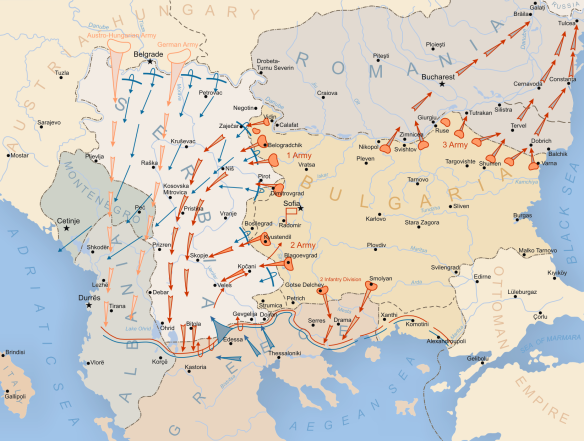
Bulgaria during World War I.
The entire eastern theater of war was deeply affected by the events that now took place in Russia. The first revolution occurred in March 1917; in November the Bolshevik victory assured that Russia would withdraw from the war. In December negotiations with Germany commenced, and in March 1918 the Treaty of Brest Litovsk was concluded. The complete collapse of the Russian ally made the Romanian position impossible. In February 1918 Bratianu was replaced, first by General Alexander Averescu and then by Alexander Marghiloman. In May the government signed the Treaty of Bucharest. Although it acquired Bessarabia, it was forced to cede Dobrudja and certain Carpathian regions. Germany gained full control over the oil production. Thus Romania, like Russia, in early 1918 had made peace and was out of the conflict.
The Greek entrance into the war was to provoke the most controversy and to be the longest delayed. Here the division in the government was to have more serious consequences for the future than elsewhere. Constantine I, who became king in 1913, was the brother-in-law of William II and, like Charles, he supported a pro-German policy. He was backed by those whose sympathies were with the Central Powers or who judged that they would be victorious. This group advised the maintenance of strict neutrality. Greece was not strong enough to stand up against British and French sea power in the Mediterranean, so an open support of Germany was not possible. In contrast, Venizelos, still the principal minister, was convinced that the Allies would win. Like Bratianu, he wished to use the opportunity to gain territory. Despite the advances made in 1912 and 1913, Greece still had claims involving Epirus, Thrace, western Anatolia, certain Aegean islands, in particular the Dodecanese, and Cyprus. The discussions on these issues were to extend over three years.
After the Ottoman Empire entered the war, the Allies were very anxious to win Greek support. During their negotiations with Bulgaria, they attempted to obtain Greek assistance in influencing that government, urging Greece to give concessions to Bulgaria in return for territory to be taken later from the Ottoman Empire. Venizelos was willing to concede the Drama- Kavalla area but only in return for the assurance that Greece would be given the Izmir (Smyrna) region in Anatolia, which had a population of about 800,000 Greeks. The acquisition of this area would give Greece effective control of the Aegean. Venizelos also wished the country to participate in the Dardanelles and Gallipoli enterprises, but he was opposed by the king and the chief of staff. In March 1915 the minister resigned, only to return to office following a major victory in the elections.
After Bulgaria entered the war, the Allies put great pressure on the Greek government to assist the Serbs. Greece did have alliance obligations from a treaty signed in 1913. In October 1915, as we have seen, Allied troops were landed in Thessaloniki, ostensibly to aid Serbia. Meanwhile, tension increased between the two factions in Athens, and Venizelos again resigned. In October 1916 the country faced a major domestic crisis. Venizelos formed a separate government in Thessaloniki, which was backed by the Allied forces there; in December Britain recognized it as the legitimate authority in Greece. At the same time, as so often in the past, a British and French fleet gathered at Piraeus. In June 1917 Constantine surrendered this throne to his second son, Alexander, and Venizelos returned in triumph to Athens. In the same month Greece entered the war. However, unlike the other states, the Greek government had received no assurances about future gains. The events of this period and the flagrant Allied intervention in Greek domestic affairs were to have lasting effects on the internal politics of the country.
Meanwhile, the decisive military campaigns were being waged in northern France. The arrival of increasing numbers of American troops, together with the failure of the German summer offensive of 1918, turned the tide of battle. In September 1918 the Allied army in Thessaloniki finally went into action. Of the twenty-eight divisions in this force, nine were Greek and six were Serbian. They were to face little opposition. The victory had already been won; the Central Powers were no longer capable of putting up an effective resistance. Bulgarian morale was understandably extremely low. From 1912 to 1918 the army had suffered huge casualties -160,000 dead and 300,000 wounded out of a population of 5 million. On September 29 the Bulgarian government surrendered; the remaining German and Habsburg troops in the peninsula were forced to withdraw quickly northward. In November Belgrade was taken and Serbian troops occupied Bosnia-Hercegovina and the Vojvodina. On November 10 Romania reentered the war, and its armies marched into the territories that it claimed.
The end of the fighting was at hand. Under extreme pressure, the Habsburg Empire simply fell apart into its national components. An Austrian Republic was established on November 13, and a Hungarian Republic three days later. On December 1 the Kingdom of the Serbs, Croats and Slovenes came into existence. Already, on October 30, the Ottoman Empire had surrendered. The war thus ended with the full victory of the Allied powers, whose numbers included the Balkan states Romania, Serbia, and Greece. Bulgaria and the Ottoman Empire were among the defeated. The Albanian government had collapsed in the first part of the war, and its territories were under foreign occupation. Whether the state would be reestablished would be determined during the peace negotiations.